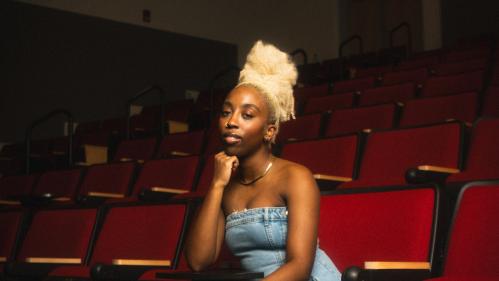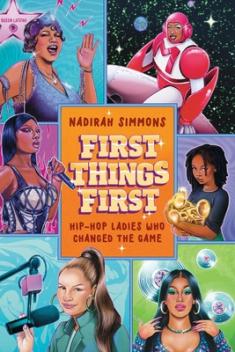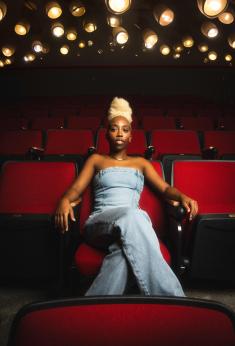Alumna’s First Book Chronicles History of Women in Hip-Hop

Nadirah Simmons spent many hours of her childhood immersed in '90s and 2000s hip-hop culture that years later would become the inspiration for her first book.
Her father owned a store called 609 in South Jersey, where he sold street wear and played rap music over the speaker. She also spent time listening to conversations about culture and music at a barbershop her uncle owned.
“I would go to visit showrooms with my father to buy for the store and was immersed by the music and the culture around hip-hop,’’ says Simmons, a 2016 graduate from the School of Communication and Information at Rutgers-New Brunswick. “Add to that hearing the music that my mom would play in the car, like Jay-Z, and then hearing the discussions amongst the men and women at my uncle's barbershop, really ingrained a culture of hip-hop and appreciation in me,” Simmons says.

On Tuesday, Simmons celebrated the release of her debut book, First Things First: Hip-Hop Ladies Who Changed the Game, which explores the contribution of women to the music she listened to growing up.
The book chronicles women in the hip-hop music industry through the decades, from personal favorites like Megan Thee Stallion, unsung trendsetters like Trina, and icons like Lil’ Kim.
The project was influenced by the music she listened to growing up, the hours she spent exploring the hidden history of the Black population of New Jersey and her time studying journalism at Rutgers.
"Growing up, my grandfather and I would often go to Burlington City, see all the older buildings, and look at the river, old Black churches and schools,’’ she said. “We would go into Philadelphia to look at the Constitution and all of the historical documents that they had to offer, and I just remember loving my time there, which just fed my love for history.”
At Rutgers she found her love of writing through the journalism program, which gave her the skills she needed to tell a story she considered overlooked.
“My parents have always told me that I loved to talk, and I remember publishing a book in elementary school, so as I pursued my college studies, I already knew that I wanted to be a writer. I like to keep up with the news, so why not offer commentary where it lacks most?” Simmons says.
Her love of news would lead her to become the social media producer for The Late Show with Stephen Colbert. Following her time there, Simmons went on to create her own online platform, The Gumbo, to discuss the stories of Black women in hip-hop.
“I remember seeing the women in the showrooms and thinking, ‘this is so cool,’ so I wanted to have a place to document all of that, but especially the women who were a part of creating the culture who looked just like me,’’ she said.
“I wanted people to get paid to discuss them, so I saved up a year of my Late Show checks to make sure that I was doing something that I would feel good about contributing to. I remember going to the museum with my parents and them always saying, ‘if it's not documented, it doesn't exist,’ so as I thought about the music that shaped me, I wanted to make sure that there was an archive of those women and their accomplishments,” Simmons said.
When it came time for Simmons to focus on writing her book, she found no place better to spend her time writing than in the public library where she spent a lot of her youth.
“I really wanted to create a book that felt very true to myself, and I felt like I wasn't able to do that anywhere else but in my hometown,” she said.

When it comes to the writing process, Simmons had a very strict routine. Spending over a year writing, revising and editing drafts, adding new content and exploring new artists led to a long process that led Simmons to find the right balance in her book. She covered different sections such as print journalism, fashion, TV and film, and other areas to show the full breadth of the talent of the women covered in the book, some favorites and some who were pivotal to the culture.
“I want people to walk away feeling inspired. I want people to laugh at the way that I wrote things. I want my personality to permeate the pages and for people to feel like they can do whatever they think by the time they put my book down. It doesn't even have to be music inspired; it can be anything in life that they want to pursue. But my aim is to show them examples of people who persevered through all the odds and were able to attain the success that they were after,” Simmons says.
As she reflects on her journey to this moment, Simmons feels pride in the legacy she has already been able to build with her work.
“As a Black person in America, there are things about myself and our culture that we don't know because we are not documenting it. So, I refused to let these women and their histories not be documented, especially since it was an issue I could solve myself,” Simmons says.




